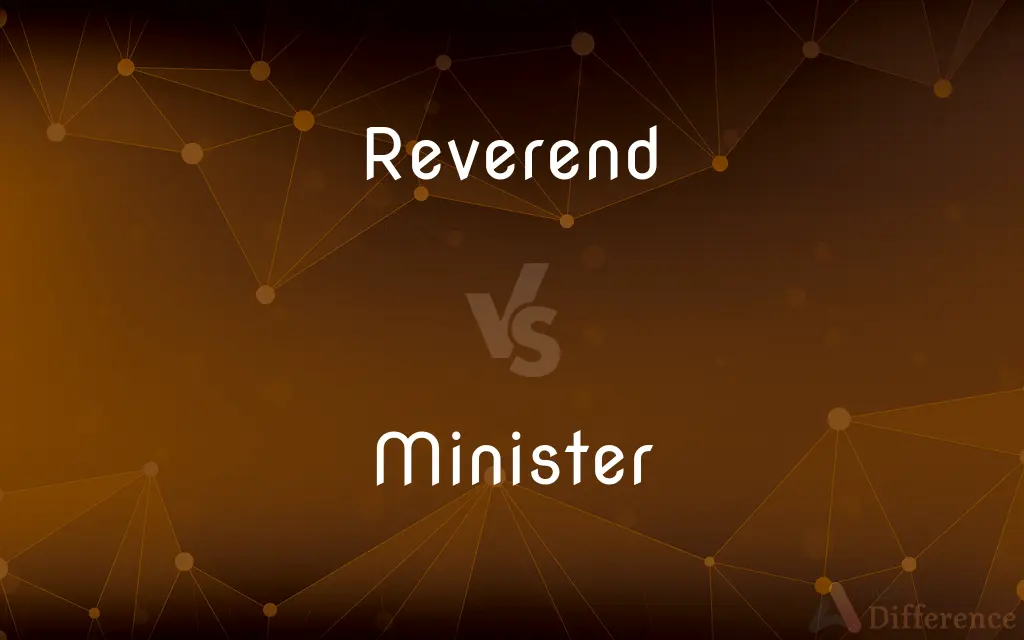Reverend vs. Minister — What's the Difference?
Edited by Tayyaba Rehman — By Fiza Rafique — Updated on September 21, 2023
Reverend is an honorific style often used to address ordained clergy, while Minister is a title or job description indicating someone who serves a religious congregation.

Difference Between Reverend and Minister
Table of Contents
ADVERTISEMENT
Key Differences
Reverend and Minister are two terms frequently used to refer to individuals involved in religious or spiritual leadership, but they have distinct meanings and usages. Reverend is commonly used as an honorific or style, much like "Mr." or "Dr.," for clergy across various religious denominations. Minister, on the other hand, is more of a functional title that describes the role or job of someone who leads or serves a religious community.
Reverend is often employed in written correspondence or formal speech to show respect to the clergy member being addressed. It is an appellation that doesn't specify the duties or responsibilities of the individual. Minister, conversely, specifically conveys the idea of service to a religious body, and it typically implies that the individual has certain responsibilities like preaching, pastoral care, or administering sacraments.
In terms of grammar, Reverend is generally used with the definite article "the" (as in "the Reverend John Smith") or with a first and/or last name. Minister, however, is usually just used directly with a name, without the article "the," like "Minister Jane Smith," or as a stand-alone title, "The minister will see you now."
Although both terms can be used across different religious traditions, the specific use of Reverend and Minister may vary depending on the denomination or religious context. For example, in certain Protestant denominations, almost all ordained clergy are called ministers, while the term Reverend might be used as a more general sign of respect or for those with more seniority.
Comparison Chart
Usage
Honorific or style
Functional title
ADVERTISEMENT
Context
General religious leadership
Specific to service in a religious community
Grammar
Usually follows "the"
Usually does not follow "the"
Variability
Across multiple religions
May be denomination-specific
Implies
General respect
Specific duties and responsibilities
Compare with Definitions
Reverend
A style used to show respect to clergy.
Reverend Mary is respected in her community.
Minister
Common in certain Protestant denominations.
The Minister was ordained in a Baptist church.
Reverend
Often used in formal correspondence.
Letters to the church are often addressed to the Reverend.
Minister
May also refer to a political role in some contexts.
The Prime Minister addressed the nation today.
Reverend
An honorific for ordained clergy.
The Reverend John officiated the wedding.
Minister
A title for someone serving in a religious leadership role.
The Minister gave a compelling sermon today.
Reverend
Not a job title, but an appellation.
The Reverend is well-liked but has no specific duties.
Minister
One who is authorized to perform religious functions in a Christian church, especially a Protestant church.
Reverend
Used across different religious traditions.
The Reverend from the local mosque was invited to speak.
Minister
Roman Catholic Church The superior in certain orders.
Reverend
Used as a title or form of address to members of the clergy
The Reverend Pat Tilly
Minister
A high officer of state appointed to head an executive or administrative department of government.
Reverend
A member of the clergy
A retired reverend
Minister
An authorized diplomatic representative of a government, usually ranking next below an ambassador.
Reverend
Deserving reverence.
Minister
A person serving as an agent for another by carrying out specified orders or functions.
Reverend
Relating to or characteristic of the clergy; clerical.
Minister
To attend to the wants and needs of others
Volunteers ministered to the homeless after the flood. See Synonyms at tend2.
Reverend
Reverend Abbr. Rev. Used as a title and form of address for certain clerics in many Christian churches. In formal usage, preceded by the
The Reverend Jane Doe.
Reverend John Jones.
Minister
To perform the functions of a cleric.
Reverend
A cleric or minister. Used with the.
Minister
To administer or dispense (a sacrament, for example).
Reverend
Worthy of reverence or respect
Minister
A person who is trained to preach, to perform religious ceremonies, and to afford pastoral care at a Protestant church.
The minister said a prayer on behalf of the entire congregation.
Reverend
Reverent
Minister
A politician who heads a ministry (national or regional government department for public service).
He was newly appointed to be Minister of the Interior.
Reverend
(informal) A member of the Christian clergy; a minister.
Minister
In diplomacy, the rank of diplomat directly below ambassador.
Reverend
Worthy of reverence; entitled to respect mingled with fear and affection; venerable.
A reverend sire among them came.
They must give good example and reverend deportment in the face of their children.
Minister
A servant; a subordinate; an officer or assistant of inferior rank; hence, an agent, an instrument.
Reverend
A member of the clergy and a spiritual leader of the Christian Church
Minister
(transitive) To attend to (the needs of); to tend; to take care (of); to give aid; to give service.
Reverend
A title of respect for a clergyman
Minister
To function as a clergyman or as the officiant in church worship
Reverend
Worthy of adoration or reverence
Minister
To afford, to give, to supply.
Minister
A servant; a subordinate; an officer or assistant of inferior rank; hence, an agent, an instrument.
Moses rose up, and his minister Joshua.
I choseCamillo for the minister, to poisonMy friend Polixenes.
Minister
An officer of justice.
I cry out the on the ministres, quod he,That shoulde keep and rule this cité.
Minister
One to whom the sovereign or executive head of a government intrusts the management of affairs of state, or some department of such affairs.
Ministers to kings, whose eyes, ears, and hands they are, must be answerable to God and man.
Minister
A representative of a government, sent to the court, or seat of government, of a foreign nation to transact diplomatic business.
Minister
One who serves at the altar; one who performs sacerdotal duties; the pastor of a church duly authorized or licensed to preach the gospel and administer the sacraments.
Minister
To furnish or apply; to afford; to supply; to administer.
He that ministereth seed to the sower.
We minister to God reason to suspect us.
Minister
To act as a servant, attendant, or agent; to attend and serve; to perform service in any office, sacred or secular.
The Son of man came not to be ministered unto, but to minister.
Minister
To supply or to things needful; esp., to supply consolation or remedies; as, to minister to the sick.
Canst thou not minister to a mind diseased?
Minister
A person authorized to conduct religious worship
Minister
A person appointed to a high office in the government;
Minister of Finance
Minister
A diplomat representing one government to another; ranks below ambassador
Minister
The job of a head of a government department
Minister
Attend to the wants and needs of others;
I have to minister to my mother all the time
Minister
Work as a minister;
She is ministering in an old parish
Minister
Indicates specific duties like preaching or pastoral care.
The Minister visited the sick member of the congregation.
Minister
Used to denote both ordained and lay leaders in some contexts.
The youth minister is not ordained but serves well.
Common Curiosities
What is a Reverend?
A Reverend is an honorific or style used to address ordained clergy.
What is a Minister?
A Minister is a title for someone serving in a religious leadership role.
Is Minister a job title?
Yes, it indicates specific duties in a religious community.
Who can be called a Reverend?
Ordained clergy across various religious traditions can be called Reverend.
Can Reverend be used in any religion?
It is used across different religious traditions but may vary in context.
Is Reverend a job title?
No, it is more of an honorific or style.
Can laypeople be called Minister?
In some religious contexts, yes. Lay leaders serving specific roles may be called Minister.
Can Reverend and Minister be used interchangeably?
Not exactly, Reverend is more of an honorific, while Minister describes a role.
How do you grammatically use Reverend?
Reverend often follows "the" and is used with a first and/or last name.
How do you grammatically use Minister?
Minister is usually used directly with a name or as a standalone title.
Who can be called a Minister?
Individuals serving in a religious leadership role, usually within specific denominations, can be called Minister.
Is Minister denomination-specific?
Often, yes. The usage of Minister can depend on the specific religious denomination.
Does Reverend imply any specific duties?
No, Reverend is more of an appellation and does not specify duties.
Does Minister imply specific responsibilities?
Yes, Minister usually indicates duties like preaching or pastoral care.
Is Reverend used in formal settings?
Yes, Reverend is often used in formal correspondence and settings.
Share Your Discovery

Previous Comparison
Squirmish vs. Squirm
Next Comparison
Shisho vs. ShisoAuthor Spotlight
Written by
Fiza RafiqueFiza Rafique is a skilled content writer at AskDifference.com, where she meticulously refines and enhances written pieces. Drawing from her vast editorial expertise, Fiza ensures clarity, accuracy, and precision in every article. Passionate about language, she continually seeks to elevate the quality of content for readers worldwide.
Edited by
Tayyaba RehmanTayyaba Rehman is a distinguished writer, currently serving as a primary contributor to askdifference.com. As a researcher in semantics and etymology, Tayyaba's passion for the complexity of languages and their distinctions has found a perfect home on the platform. Tayyaba delves into the intricacies of language, distinguishing between commonly confused words and phrases, thereby providing clarity for readers worldwide.















































